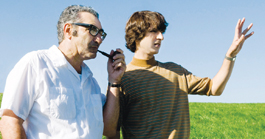home | metro santa cruz index | movies | current reviews | film review

DREAMERS: Max Yasgur (Eugene Levy, left) and Elliot Tiber (Demetri Martin) plan for three days of musical memories in 'Taking Woodstock.'
Free Festival
Ang Lee's 'Taking Woodstock' is more than just nostalgia for the mud and brown acid.
By Richard von Busack
MAYBE YOU have to be really Apollonian to make a truly Dionysian film. And Taking Woodstock is way more than what the French call "nostalgia for the mud." Ang Lee and constant collaborator James Schamus bring their customary historical density to this view of the three-day-long music festival in upstate New York, August 1969. There are no significant anachronisms to throw you back into 2009, none of the sense of modern-day actors swishing their wigs around to an array of moldy oldies.
The slightly faded colors and the split-screen honor our traditional view of the festival, learned from the documentary Woodstock. The faces and bodies here look right--soft and freshly formed. The soundtrack by Danny Elfman doesn't frog-march the viewer down Memory Lane--a few familiar songs, like "Wooden Ships" and "Going Up the Country," appear, but most of the soundtrack is lesser-known psychedelia.
This film won't mollify hippie-haters, even though it acknowledges the Porta-Potties, the drenched fields and the chocolate-colored slop on the ground. But Taking Woodstock's makers also note the tensions and pretensions of these '60s types; Lee and Schamus aren't out to do any Woodstock Nation building. Based on Elliot Tiber's memoir, the film tells the story of Elliot Teichberg (Demetri Martin) trying his best to keep the family's decaying and overmortgaged Catskills motel open in the summer of 1969. Its several clapboard cabins are being engulfed by poison sumac; the swimming pool is personally Cloroxed by Ellliot's father, Jake (Henry Goodman), a roofer by trade.
"Excuse our appearance while we remodel" signs try to make up for the fact that the towels here require a dollar deposit. Ornery mother Sonia (Imelda Staunton, uproarious) greets guests with the warm welcome you'd expect at a skid-row flophouse. This area was once the refuge for New York Jews escaping the tropical summer heat, and there's plenty of ambient anti-Semitism among the locals, just waiting for a little conflict to dig it out.
Elliot is going nuts trying to keep the place going with an arts festival; he has a troupe of Living Theater types called the Earth Light players rehearsing in the barn. He's the youngest head of the chamber of commerce in the history of Bethel, N.Y. In desperation after hearing that a nearby community is going to cancel a huge rock concert because of fear of rampaging hippies, Elliot has the inspiration to contact the local dairy farmer Max Yasgur to see about renting his pastures for a concert.
The festival's chaos helps Elliot get free of his mad mother; it takes the cork out of his bottled-up sexuality and finally gives him rebirth in the womb of a VW van with a tab of blotter acid and two friendly West Coasters (Paul Dano and Kelli Garner). In this sequence, augmented by computer-animation, Elliot gets as close to the concert as he's going to get. It's a vision of a far-off electrified stage glittering and surrounded with a glittering nebula of humanity (the LSD is still doing its work).
Martin is excellent in the lead role. He resembles Dustin Hoffman, but he may be a more inclusive and tart actor; the recessive comic reactions to the pressures on all sides of him keep the film funny throughout. The supporting acting builds Lee's vision of harmonizing eccentricities. Emile Hirsch is maybe the exception; playing a traumatized young Nam vet, he sticks out like a sore trope. But Liev Schreiber's Marine-sergeant-turned-drag-queen Vilma is a pure delight; it's a performance on the far side of camp, with only a slight italicization in the words to mark his own unusualness. The great Eugene Levy plays old Yasgur as a man as ruminative as his cows; as always, Levy revels in the beauty of being a square (posed, holding his tobacco pipe like a scientist in a 1950s movie).
It's not easy to make a good movie about this event; the younger the viewer, the sicker they are of hearing about it. Taking Woodstock's serene appreciation for a passing time makes this one of the best fictional movies about the 1960s. It's the history lover in Schamus and Lee that appreciates Woodstock's uniqueness, and its ultimately transitory nature.
![]() TAKING WOODSTOCK (R; 110 min.), directed by Ang Lee, written by James Schamus, photographed by Eric Gautier and starring Demetri Martin, opens Friday countywide.
TAKING WOODSTOCK (R; 110 min.), directed by Ang Lee, written by James Schamus, photographed by Eric Gautier and starring Demetri Martin, opens Friday countywide.
Send a letter to the editor about this story.
|
|
|
|
|
|